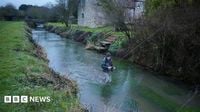A group of fishermen has won a significant legal battle against the government regarding the health of the Costa Beck river near Pickering, a once-thriving fishing spot that has suffered from pollution over the years. The High Court ruled in 2023 that the government's management plan was insufficient, leading to a dramatic decline in fish populations. Following the government's appeal, which was dismissed on April 2, 2025, the ruling sets a precedent for river restoration efforts across the country.
The Pickering Fishery Association, alongside the environmental organization Fish Legal, took the government to court to address the deteriorating condition of the Costa Beck. The High Court's decision confirmed that the government's plans to rehabilitate the river were inadequate, failing to meet legal requirements for environmental protection.
Andrew Kelton, a solicitor representing Fish Legal, expressed optimism following the court's decision, stating that it should be "a turning point for improving river health nationwide." He emphasized the importance of this ruling as a blueprint for restoring damaged rivers throughout England.
A spokesperson from the Department for Environment, Food and Rural Affairs (Defra) acknowledged the challenges faced in cleaning up polluted waterways. They stated, "We are determined to clean up our polluted rivers, lakes and seas" and highlighted their commitment to addressing the issues raised by the court ruling. The spokesperson noted that an Independent Water Commission has been launched to examine the effectiveness of the current water management system, including the Water Framework Directive and River Basin Management Plans.
However, Penelope Gane, head of practice at Fish Legal, criticized the government for prolonging the legal process. She remarked, "[The government] could have dropped this appeal, but instead they have dragged out the legal process, wasting time and taxpayer money trying to defend continued inaction to restore not only the Costa Beck, but rivers nationwide." Gane pointed out that only 16% of waterbodies and 14% of rivers in England currently achieve "good ecological status," underscoring the urgent need for effective action.
The Costa Beck's decline has been attributed to a combination of sewage pollution and agricultural runoff, which have severely impacted its ecosystem. The anglers, who have dedicated over a decade to advocating for the river's restoration, successfully argued that the government's and the Environment Agency's plans were too vague to be effective.
In a separate legal challenge, anglers from North Yorkshire also contested the government's plans for the Upper Costa Beck, which had been devastated by similar pollution issues. Environment Secretary Steve Reed had argued that cleaning up the waterway was administratively unworkable, but the appeal court dismissed this claim on the same day as the Costa Beck ruling.
Kelton highlighted the broader implications of this case, stating, "This case goes to the heart of why the government has failed to make progress towards improving the health of rivers and lakes in England." He noted that the Upper Costa Beck is just one of nearly 5,000 waterbodies in England that have struggled to meet ecological standards.
Despite the government's acknowledgment of the need for reform, many advocates remain skeptical. Gane stressed the necessity for meaningful action to clean up the rivers, stating, "Anything short of that will be a tacit admission that the government has abandoned its environmental ambitions for water."
The recent court decisions have reignited discussions about the government's commitment to environmental protection and the effectiveness of existing regulations. As the country grapples with the pressing issue of water pollution, the outcomes of these legal battles may serve as a catalyst for more robust action to restore and protect vital ecosystems.
With the government now facing increased scrutiny over its environmental policies, it remains to be seen how they will respond to the court's decisions and the ongoing challenges of maintaining clean waterways. As the situation develops, the voices of local communities and environmental advocates will be crucial in shaping the future of river management in England.





